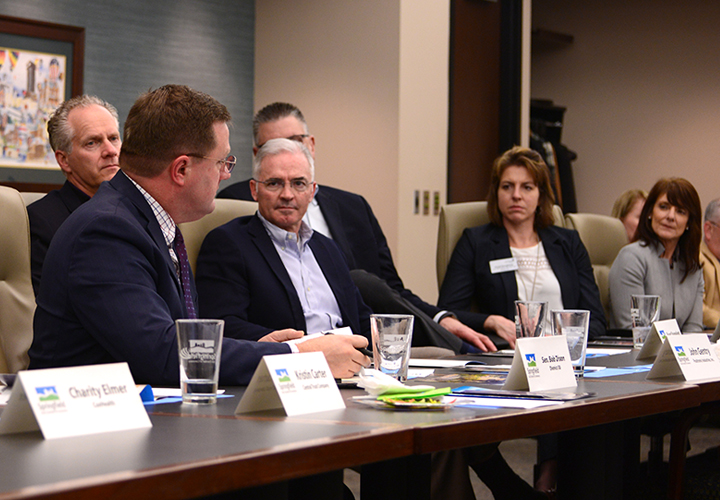Annual legislative luncheon highlights Chamber priorities

In addition to marking the beginning of the new year, January also brings the beginning of the new state legislative session – and the chance for the Chamber’s volunteer leaders to connect with our local legislative delegation about the issues most important to our members.
January 12 was the date of our annual Legislative Luncheon at the Chamber offices, when members of the Chamber’s volunteer leadership team sat down with elected officials from our state local delegation to highlight the most pressing legislative issues for the business community during the 2018 legislative session.
Chamber Chairman Doug Neff expressed the Chamber’s appreciation for the difficult work the legislators do, especially in the current tough budget climate. “Thank you so much for what you do,” he told those gathered. “We know it’s hard work, and your service is appreciated.”
While there wasn’t enough time to highlight every item in our 2018 State Legislative Agenda, speakers did focus on several key issues. One such issue is continued funding for workforce development programs. Debbie Shantz Hart, co-owner of Housing Plus and a past Chamber chairman, noted that funding for the state’s customized workforce training program will expire in 2019.
“We need innovative approaches to workforce education,” she said, adding that the Chamber also opposes efforts to divert investments away from public education. “We need to prioritize investment in our schools and our workforce.”
Jeff Childs, SVN/Rankin Company stressed the need for strong economic development programs at the state level and noted that investing in the right programs helps everyone. “With the proper funding and reauthorization of these economic and workforce development programs, everyone wins - the employer, the employee, and the state. It is our goal that Missouri can help employers grow jobs while expanding the earning potential of workers … all while increasing the state’s income tax revenue stream.”
The need for funding also extends to higher education—Past Chairman John Wanamaker of BKD, LLP noted the need for consistent funding in the state’s core budget for both the Springfield Clinical Campus program, a combined effort of University of Missouri, CoxHealth and Mercy, and the mechanical engineering program, a partnership between Missouri State University and Missouri University of Science and Technology, as well as protecting against further cuts to higher education, that took the brunt of the budget hit in 2017.
Transportation funding also is a high priority, as Charity Elmer of CoxHealth noted, pointing out that Missouri is seventh in the nation in total road miles but 47th in funding. Elmer called for legislators to lead the state in finding solutions to new funding to protect our geographic asset in the center of the nation by investing in infrastructure.
With these priorities and an admittedly tight budget – and a $300 million deficit to address – the Chamber also advised against additional broad-based tax cuts or revenue reductions that could further damage our state’s revenue base beyond repair, and Mike Haynes of AT&T advocated instead for methods to enhance revenue such as the streamlined sales tax, a review of rewards for timely filing of business sales taxes and reviews of tax credits without measurable return on investment.
While the meeting covered many hard-hitting topics, the legislators were pleased with the thoughtful discussion and feedback, and commented on the value of hearing directly from business leaders on their priority issues.
“I love talking with you guys about these issues because of how much energy and research you put into the issues,” said Sen. Jay Wasson (R-Nixa). “Honestly, I wish this meeting lasted a half hour longer.”

